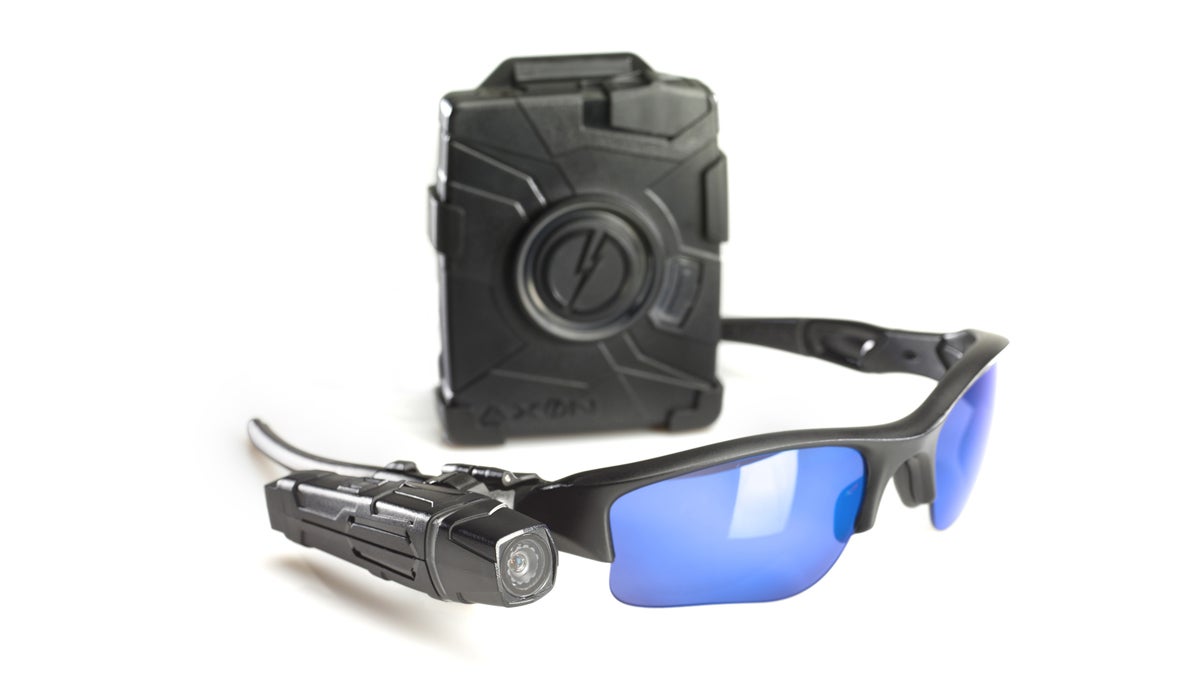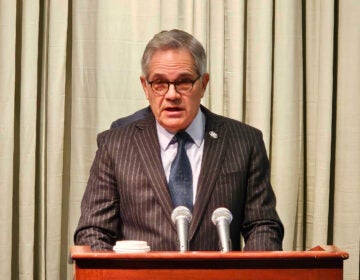Without bidding, Taser gets contract for Philly’s next phase in police body camera effort

Taser's Axon flex and body cameras. (PRNewsFoto/TASER International)
Philadelphia Mayor Jim Kenney announced last week the city’s police department plans to expand its body camera initiative from a few dozen in one district to equipping 800 officers with the recording devices citywide.
And now, city officials have settled on the company that will hugely boost the program: Taser International.
City records show that Philadelphia’s Police Department has a $1.4 million contract with Taser that is expected to cover hundreds more cameras, the cost of evidence storage and equipment upgrades.
Officials confirm, up to $700,000 of that can pay for the first round of hundreds of new body cameras, and the remainder will fund equipping the entire Central Division with the devices, according to documents obtained through a right-to-know request.
Philadelphia had an existing contract with Taser for the stun guns, so it was easy to piggyback on that for the body cameras.
The Arizona-based company best known for those stun guns has lately come under fire in other major police departments for allegedly cutting corners to secure no-bid contracts and for establishing cozy relationships with police chiefs to land multimillion-dollar sweetheart deals.
In Philadelphia, there was no competitive bidding to provide the latest batch of cameras. During the pilot program in the city’s 22nd District in North Philadelphia, officers tested body cameras from seven companies, and Taser’s product was the preferred one, officials said.
“Currently, the city has no procurement vehicle for these specific goods and services and a competitive bid for these services would be time prohibitive,” Public Safety Program Manager Michael Vidro wrote in a January memo.
Cause for concern?
The deal has raised alarms for some contract experts.
Attorney Christopher McCabe, who used to work in the city’s law department, said the deal may violate Philadelphia’s public bidding rules.
“When it comes to the purchase of generic items, like body cameras, the bedrock rule for city contracting is sealed, competitive bidding, duly advertised, with the contract being awarded to the lowest responsive, responsible bidder,” he said.
“We know what the city will pay to Taser. We won’t know what the city might have paid to a different vendor”
Piggybacking the body camera deal on an existing contract is not following best practices, according to Mike Purdy, a government contracting consultant. The city’s own procurement rules for goods and services require that contracts be awarded after a competitive process. After all bids are in, the city is supposed select the lowest-bid contractor. Yet officials say the early pilot program tested out many different types of devices, saying that was a type of vetting process.
“That’s not really a bid, or a request-for-proposals process at all,” Purdy said, adding that it seems as if Philadelphia officials are siding with expediency over transparency and compliance.
But Philadelphia procurement officials point to state compliance standards which provide a number of loopholes around competitive bidding when it’s “in the best interests of the Commonwealth.”
A request-for-proposals process, also known as an RFP, can sometimes be an impediment to quickly getting body cameras in the hands of officers, said Josh Isner, Taser’s vice president of global sales.
“Instead of delaying the process with an RFP, they said, ‘Hey, look, we know what we want, we know what the best product is, and we’re going to negotiate with that vendor,'” Isner said.
According to Trevor Day, Philadelphia’s chief procurement official, an RFP will be sent out in the coming months seeking a company to supply the city with thousands more body cameras to equip the entire 6,500-member force.
He notes that Taser’s existing business relationships with the city — for stun guns, cameras and evidence storage — will not influence the outcome of that bidding process.
Banking on storage
The storage feature was seen as a major factor in Taser winning the contract.
Taser sells hardware to city police departments as a way to pitch subscriptions to a footage storage site called Evidence.com. It’s not dissimilar from the way cell phone companies sell service packages via smartphones.
“We really view Evidence.com as the iTunes of law enforcement,” said Isner.
Police departments could pay up to around $100 per month, per officer, for subscriptions to Evidence.com, Isner said.
Lt. John Stanford with the city’s policy department would not talk about the arrangement struck with Taser.
He did say that during the pilot program, officers gave positive feedback about the Taser cameras, but, as other departments have discovered, maintaining the footage is a resource drain.
“I think every single department in this country has expressed concerns and issues about storage,” Stanford said.
The cameras Philadelphia will be purchasing can capture about 70 hours of filming per shift. That footage is then sent to a cloud service maintained by Taser. Around 60 engineers in Seattle work to maintain the video evidence.
‘The money is great’
Police departments in Chicago, Los Angeles, Washington, D.C., Dallas, and other cities have recently signed deals with Taser to expand body camera programs, seen by some law enforcement watchdogs as a way to increase transparency and mitigate instances of excessive force.
For Taser, the calls for greater oversight of city police officers have yielded sweet profits. Sales of body-worn cameras and Evidence.com subscriptions leaped 82 percent from its year-ago level, according to the publicly traded company’s latest quarterly report. That translated into $44.7 million in sales of body cameras and Evidence.com.
The Department of Justice last year handed $20 million in grants to municipalities big and small looking to invest in body cameras.
Philadelphia did not receive any money through last year’s grant program, but the city will have another shot at federal assistance in 2016. In many of the cities that received Department of Justice Funds, Taser was the chosen vendor.
“It’s really great to see the federal government recognize that body-worn cameras are a key part of solving this transparency issue between police officers and the public,” Taser’s Isner said. “And the money is great, too.”
—
This is an updated story. A previous version did not make it completely clear this was an expansion of an existing contract. Also it wrongly attributed a line to a Kenney spokesman.
WHYY is your source for fact-based, in-depth journalism and information. As a nonprofit organization, we rely on financial support from readers like you. Please give today.




